
Cuisine
Norwegian cuisine
Norwegian cuisine is heavily influenced by the country's geography and climate. The long coastline and cold waters of the North Atlantic provide an abundance of seafood, while the harsh winters and short growing season make fresh produce scarce. Traditional dishes include lutefisk (dried cod soaked in lye), rakfisk (fermented trout), and fårikål (lamb stew with cabbage and potatoes). Modern Norwegian cuisine has been influenced by international trends, but still emphasizes local and seasonal ingredients.
Typical ingredients
Fish (salmon, cod, herring), Potatoes, Root vegetables (carrots, turnips, parsnips), Game meats (elk, reindeer), Dairy products (cheese, butter), Berries (lingonberries, cloudberries), Herbs (dill, parsley)
Presentation and garnishing
Norwegian cuisine is often presented in a simple and rustic manner, with an emphasis on natural flavors and textures. Garnishes are typically minimal, with fresh herbs or berries used sparingly.
Norwegian cuisine has gained international recognition in recent years, with several Norwegian restaurants receiving Michelin stars. The New Nordic cuisine movement, which emphasizes local and sustainable ingredients, has also helped to raise the profile of Norwegian cuisine.
More cuisines from this region...
Swedish cuisine, Icelandic cuisine, Finnish cuisine, Danish cuisine, Sami cuisine
History
Norwegian cuisine has a long history dating back to the Viking era. The harsh climate and limited resources forced early Norwegians to be creative with their cooking, resulting in dishes like dried and salted fish that could be stored for long periods of time. In the 19th century, Norwegian cuisine was heavily influenced by French cuisine, as many Norwegian chefs trained in France. Today, Norwegian cuisine is a blend of traditional and modern influences.
Cultural significance
Norwegian cuisine is an important part of the country's cultural heritage. Traditional dishes are often served on special occasions and holidays, and many families have their own recipes that have been passed down for generations. The use of local and seasonal ingredients is also an important aspect of Norwegian cuisine.
Health benefits and considerations
Seafood is a good source of omega-3 fatty acids, which are important for heart health. However, some traditional Norwegian dishes are high in salt and fat, so should be consumed in moderation.
Norwegian cuisine dishes Browse all »

Rosettbakkels
Rosette Cookies
Rosettbakkels is a traditional Norwegian cookie that is often served during Christmas time. It is a thin, crispy cookie that is shaped like a rosette.

Løk med ostesaus
Onions with Cheese Sauce
Løk med ostesaus, or onions with cheese sauce, is a classic Norwegian dish that is perfect for a cozy night in. This dish is made with tender onions, a creamy cheese sauce, and...

Brunost ostekake
Brown Cheese Cheesecake
Brunost ostekake is a traditional Norwegian cheesecake that is made with brown cheese, cream cheese, and sour cream. It is a rich and creamy dessert that is perfect for any...

Kjøttboller
Norwegian meatballs
Kjøttboller are traditional Norwegian meatballs made with ground beef, pork, or a combination of both. They are typically served with mashed potatoes, lingonberry sauce, and gravy.

Kransekake
Kransekake is a traditional Norwegian cake that is typically served at weddings, Christmas, and other special occasions. It is a tower-shaped cake that is made from rings of...
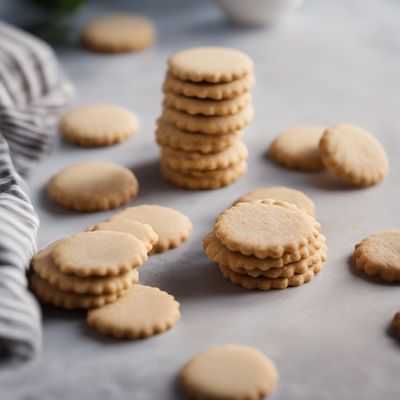
Sandnøtter
Sandnøtter, also known as sand cookies, are a traditional Norwegian cookie that is perfect for a quick snack or as a dessert after a meal. These cookies are delicate and...
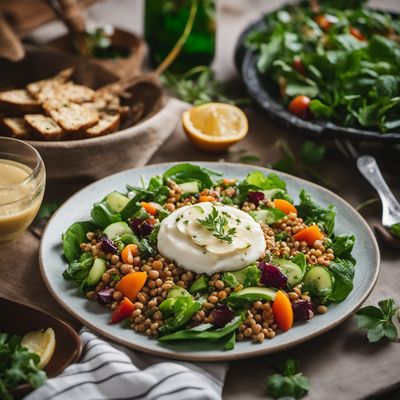
Byggrynssalat
Byggrynssalat is a healthy and delicious salad made with barley, vegetables, and herbs. It is a popular dish in Scandinavia and is often served as a side dish or a light lunch.

Jarlsberg torsk
Jarlsberg Cod
Jarlsberg torsk is a traditional Norwegian dish that consists of baked cod topped with Jarlsberg cheese and served with a side of boiled potatoes and carrots.
Norwegian cuisine recipes Browse all »
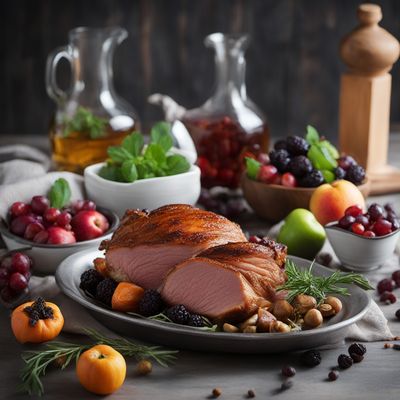
Norwegian Roast Pork with Fruit
Nordic Delight: Roasted Pork with a Sweet Twist
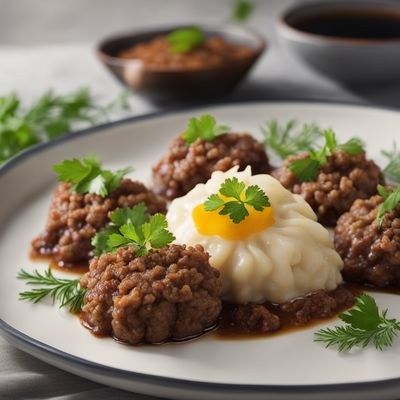
Klimpor fra Ryfylke - Norwegian Dumplings
Savory Norwegian Dumplings: A Taste of Ryfylke

Norwegian-style Sweet and Spicy Chicken
Nordic Fusion: Sweet and Spicy Chicken with a Norwegian Twist
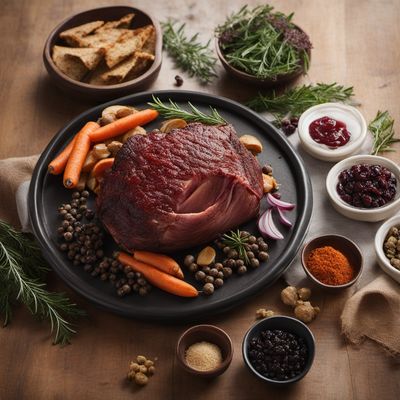
Smoked Sheep's Head with Traditional Norwegian Accompaniments
Norwegian Delicacy: Smoked Sheep's Head with Authentic Flavors
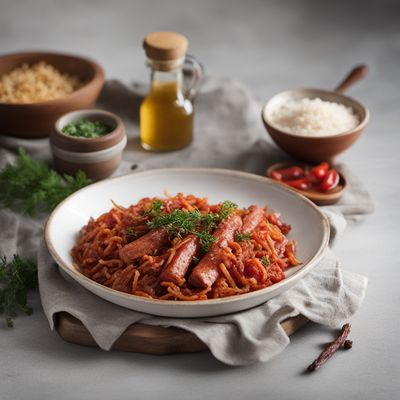
Norwegian Pølse med Lompe
Savory Norwegian Delight: Pølse med Lompe
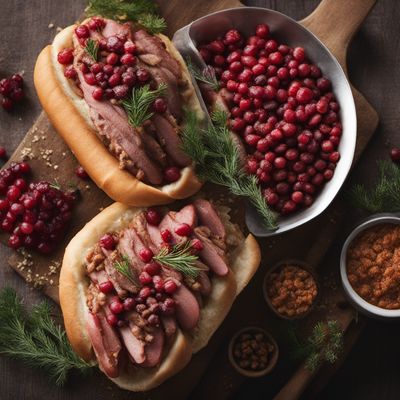
Norwegian Reindeer Hot Dog
Savory Delight: Norwegian Reindeer Hot Dog with Lingonberry Relish
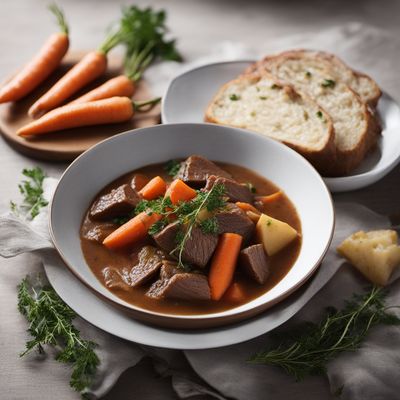
Norwegian Beef Stew with Root Vegetables
Hearty Nordic Delight: Norwegian Beef Stew with Root Vegetables
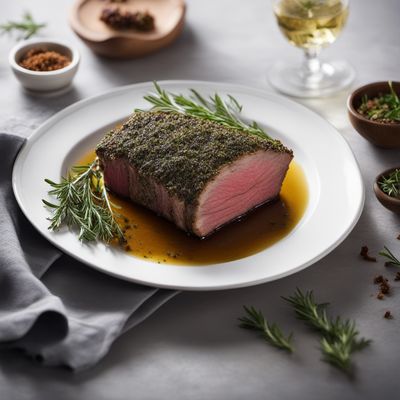
Roasted Easter Lamb with Herb Crust
Savory Spring Delight: Herb-Crusted Roasted Easter Lamb

Norwegian Green Pea Soup with Bacon
Savory Delight: Norwegian Green Pea Soup with Crispy Bacon
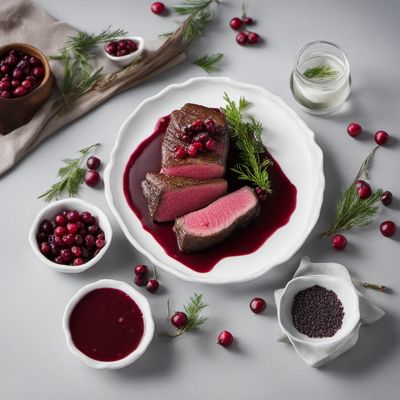
Norwegian Arctic Reindeer Steak with Lingonberry Sauce
Nordic Delight: Savory Reindeer Steak with Tangy Lingonberry Sauce
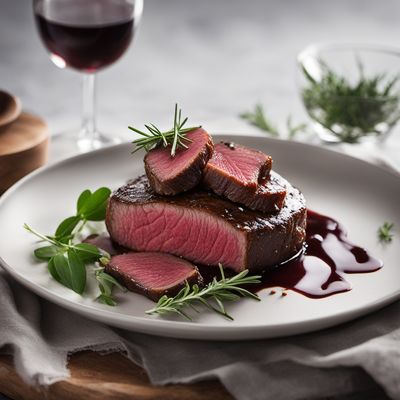
Norwegian Venison Steak with Wild Game Sauce
Nordic Delight: Savory Venison Steak with Wild Game Sauce
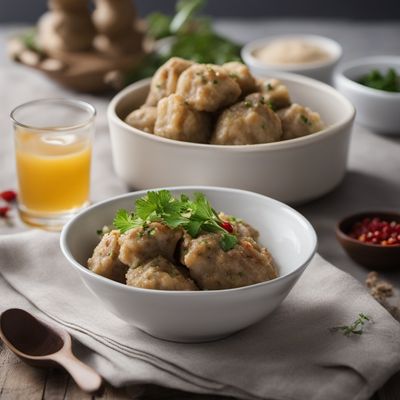
Norwegian Buckwheat Dumplings
Hearty Buckwheat Dumplings: A Taste of Norway